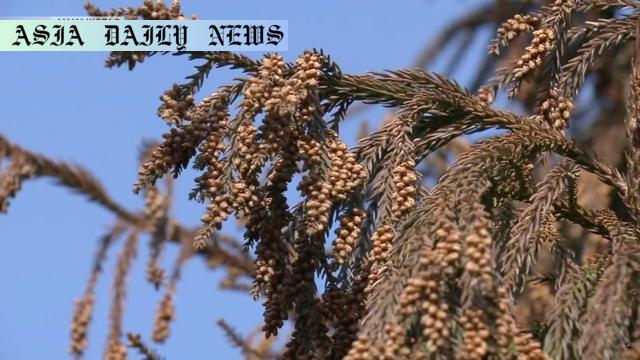Pollen season begins earlier than ever, with high dispersion levels causing heightened allergy risks for residents across Japan.
Key Point 1: Japan’s 2023 pollen season begins record early, observed on January 8 in Tokyo.
Key Point 2: Male cedar flower buds, key pollen contributors, exceed 10-year averages nationwide.
Key Point 3: Western Kinki region reports a 5.6-fold increase in Kyoto pollen levels.
Key Point 4: High pollen dispersion may lead to allergy development in previously unaffected individuals.
Key Point 5: Early precautions, including medication and anti-pollen products, are strongly advised.

Pollen Season Starts Record Early in Japan
Japan’s 2023 pollen season has stunned both residents and experts by starting unusually early this year. Airborne cedar pollen was detected in Tokyo as early as January 8, setting an alarming new record for early onset. Typically, the season begins in February, but this shift has been attributed to environmental changes affecting cedar trees.
Record-Breaking Cedar Bud Proliferation
An environmental ministry survey revealed an increase in male cedar flower bud growth, responsible for creating the allergy-inducing pollen. National data indicates that the numbers exceed the average recorded over the past decade, with notable surges in regions like Kyoto and Osaka. Kyoto alone saw a staggering 5.6-fold increase in male cedar buds compared to its 10-year average, raising concerns for locals and visitors alike.
Impact on Residents
The heightened levels of airborne particles could lead to widespread discomfort for individuals with preexisting allergies. Senior researcher, Hiroshi Saito, from the Kanagawa Prefectural Natural Environment Conservation Center, highlighted that those who have never experienced hay fever symptoms might develop sensitivities this year. For those already suffering, symptoms such as sneezing, itchy eyes, and nasal congestion could escalate significantly.
Precautionary Measures
Experts are urging citizens to act early by taking preventative measures. This includes using over-the-counter anti-pollen medications and seeking medical guidance. According to Saito, medications tend to be more effective when used before symptoms manifest. Recognizing this need for early action, some pharmacies, such as one in Tokyo, have proactively stocked anti-pollen products weeks ahead of the usual timeline.
Future Concerns
The early start of the pollen season raises broader questions about environmental change in Japan. Climatic shifts, urbanization, and agricultural practices are all being examined as possible contributors to this trend. Local authorities and environmentalists are calling for long-term studies to better understand how Japan’s ecosystems are adapting and changing over time.
Global Relevance
Japan’s pollen crisis serves as a reminder of how environmental changes can have rapid and tangible effects on daily life. This phenomenon also highlights the interconnectedness of ecosystems and human health. As other nations observe similar seasonal anomalies, global collaboration in research and prevention will become increasingly vital for mitigating such challenges.
Commentary
Environmental Changes and Their Ripple Effect
The record early start to Japan’s pollen season this year is another stark reminder of the impact of environmental changes. While seasonal shifts might seem harmless at first glance, their effects on human health can be profound, and Japan’s case is a clear illustration of this. Allergies, often trivialized, can severely disrupt an individual’s daily life, from productivity at work to overall wellbeing.
The Role of Ecosystem Dynamics
The rise in male cedar flower buds provides an intriguing insight into how shifts in one part of an ecosystem can cascade across others. For instance, factors like temperature changes, urbanization, and land use inevitably influence plant behavior, from flowering cycles to pollen production. This year’s surge in pollen levels speaks to the broader issue of how ecosystems are adapting — or struggling to adapt — in response to environmental stressors.
Proactive Measures Are Key
What’s especially striking is how early intervention can significantly mitigate the impact of such challenges. Japan’s environment ministry, medical professionals, and even local businesses have recognized the need for timely action, from stocking anti-pollen products earlier to raising awareness among the population. These collective efforts are a testament to the importance of preparedness in the face of environmental shifts.
Looking Ahead
As we witness these changes, there’s an urgent need for research and dialogue at both national and international levels. Studying seasonal anomalies and their root causes will equip us to better manage their consequences. Overall, Japan’s pollen season is not just a health issue; it is a window into the relationship between humans and their rapidly changing environment, and this relationship requires our careful stewardship moving forward.


